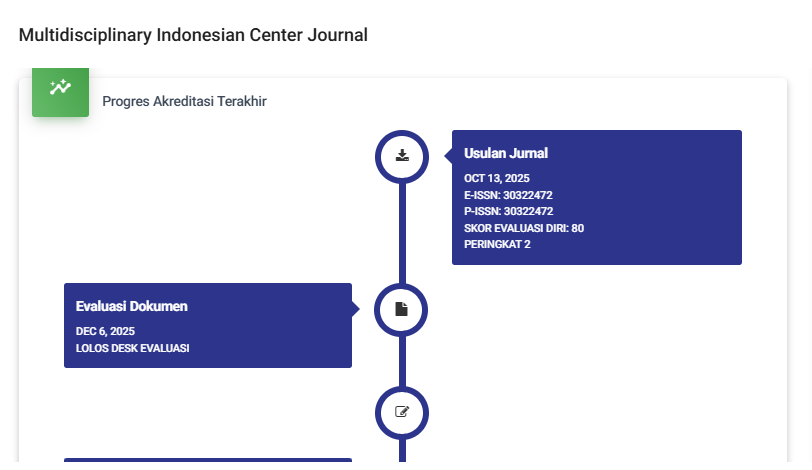BRIDGING CULTURES: THE IMPACT OF BAHASA INDONESIA ON INTERNATIONAL LEGAL DIPLOMACY
DOI:
https://doi.org/10.62567/micjo.v2i2.743Keywords:
Bahasa Indonesia, International LawAbstract
This research explores the role of Bahasa Indonesia in shaping international legal diplomacy through a doctrinal legal analysis. By examining primary legal sources, such as treaties, diplomatic correspondences, and international agreements involving Indonesia, alongside secondary sources including scholarly articles, legal commentaries, and historical analyses, this study aims to uncover how Bahasa Indonesia functions as a diplomatic tool in legal contexts. The research critically analyses the extent to which language can bridge cultural and legal divides, enhance mutual understanding, and influence the negotiation and interpretation of international agreements. By situating Bahasa Indonesia within broader legal and diplomatic frameworks, this study offers insights into the intersection of language, culture, and law on the global stage, highlighting the strategic importance of linguistic identity in international legal diplomacy.
Downloads
References
Alam, G. N., Mahyudin, E., Affandi, R. N., Dermawan, W., & Azmi, F. K. (2022). Internasionalisasi bahasa indonesia di asean: suatu upaya diplomatik indonesia. Dinamika Global Jurnal Ilmu Hubungan Internasional, 7(01), 25–53. https://doi.org/10.36859/jdg.v7i01.1039
Effendi, T. D. (2016). Bahasa Indonesia Diplomacy and Other Country Language Diplomacy Experiences. https://eprints.umm.ac.id/42497/
Elvardi, J., Hasan, F., & Pratama, A. (2022). The use of Language In International Agreements According to The 1969 Vienna Convention And Its Implementation In Indonesian National Law. Yuridika, 37(3), 515–538. https://doi.org/10.20473/ydk.v37i3.28448
Harmoko, D. D. (2015). Analisa bahasa indonesia sebagai bahasa komunikasi antar negara anggota asean. 1(1), 1–6. http://seminar.bsi.ac.id/snit/index.php/snit-2015/article/view/192
Heddaya, M., Dworkin, S. S., Tan, C., Voigt, R., & Zentefis, A. (2023). Language of Bargaining. https://doi.org/10.18653/v1/2023.acl-long.735
Hermawan, Y. P., & Habir, A. D. (2015). Indonesia and International Institutions: Treading New Territory (pp. 177–194). Palgrave Macmillan, London. https://doi.org/10.1057/9781137397416_9
Kharel, A. (2018). Doctrinal Legal Research. Social Science Research Network. https://doi.org/10.2139/SSRN.3130525
Majeed, N., Abu Hilal, A., & Khan, A. N. (2023). Doctrinal Research in Law: Meaning, Scope and Methodology. Bulletin of Business and Economics. https://doi.org/10.61506/01.00167
Moser, C. (2024). The practice of multilingualism in legal scholarship – A case study on the use of French and the research on francophone law at the Max Planck Institute for International Law in Heidelberg and beyond. Recht Und Zugang, 5(1), 41–60. https://doi.org/10.5771/2699-1284-2024-1-41
Okwong, E. B., & Vivekanandam, B. (2024). Implementation of Digital Educational Technology: Issues for Managerial Consideration in Nigeria's Public Sector. International Journal of Emerging Issues in Social Science, Arts, and Humanities, 3(1), 12-21. Lincoln University College. DOI: 10.60072/ijeissah.2024.v3i01.002.
Sayın, F. M., & Sayın, B. A. (2013). Old and New Diplomacy and the Role of Communication. Ekonomik ve Sosyal Araştırmalar Dergisi. https://dergipark.org.tr/tr/download/article-file/69279
Tomuschat, C. (2017). The (Hegemonic?) Role of the English Language. Nordic Journal of International Law, 86(2), 196–227. https://doi.org/10.1163/15718107-08602003
Utama, M. A. R. (2020). Bahasa Indonesia as Official National Language: The Legal Aspect of Presidential Regulation Number 63 of 2019. 6(2), 185–188. https://doi.org/10.15294/LRRQ.V6I2.37723
Xhemaili, M. (2022). The importance of the english language in public diplomacy and international relations. Journal of Liberty and International Affairs, 8(1), 322–339. https://doi.org/10.47305/jlia2281322x
Downloads
Published
How to Cite
Issue
Section
License
Copyright (c) 2025 I Wayan Alit Sudarsana, Manual Selvaraj Bexci

This work is licensed under a Creative Commons Attribution-ShareAlike 4.0 International License.



























